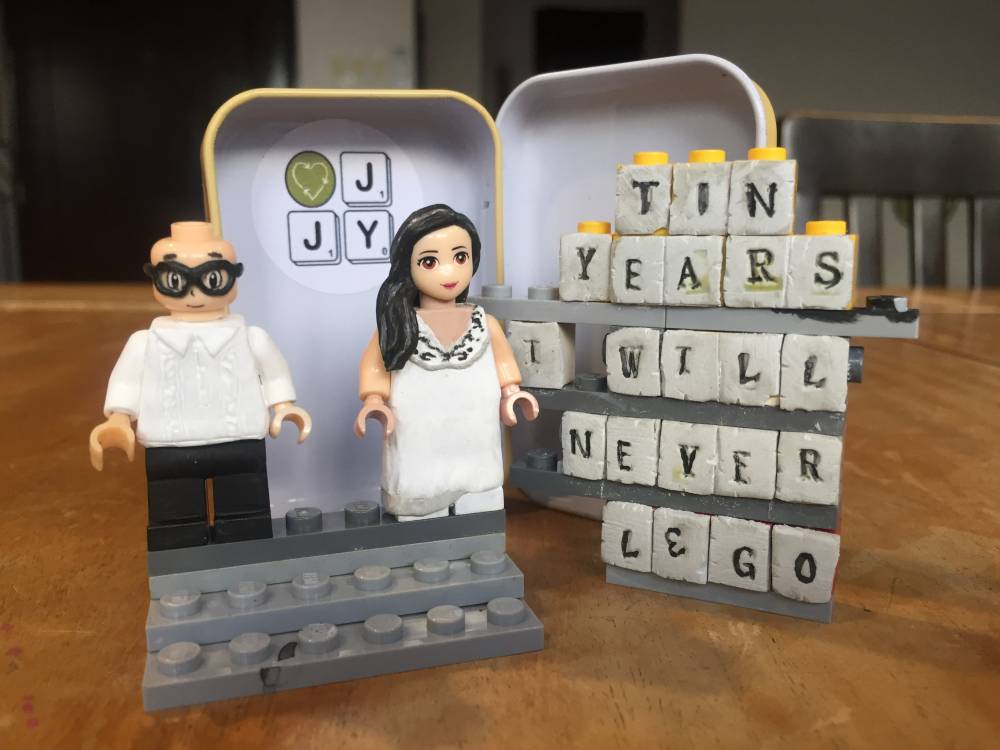When the pieces no longer fit

Every first Sunday of the month, our parish priest invites those with birthdays and anniversaries to the front for a special blessing. Couples share how long they’ve been married, and the priest joyfully proclaims, “You may kiss the bride!” The congregation cheers at the impromptu renewal of vows.
When my 9-year-old daughter asked, “Will you still go to the front?” I hesitated. This month marks 15 years of marriage, but also eight months since the truth unraveled our lives. The day now feels heavy and hollow, a reminder of the artificial stability my children and I unwittingly find ourselves in.
It’s hard not to think back to our 10th wedding anniversary, the “tin” year. I had gifted my husband custom-sculpted Lego mini-figures of us, packed in a tin case with the words, “Tin years I’ll never Lego.” At the time, it felt like a fun and enduring way to symbolize our commitment to never “let go.” But like the tiny plastic bricks, what I thought was unshakable collapsed.
I feel angry, fearful, sad, and numb. The emotions come in waves. Sometimes, they smash against what I envision to be my strong body, perpetually bruised from combat sports and battle-ready from deflecting Parkinson’s on auto-pilot. Other times, they consume me, leaving me crumbled like an abandoned sandcastle.
But I only stay submerged for as long as I sense it pull away, and that time has to be enough for me to set my face to flint once more. Every day is a fake-it-till-you-make-it day, which I don’t think I will ever get used to.
Like Kodak film or floppy disks, my marriage has become obsolete. Once ubiquitous, they’ve vanished into irrelevance. Yet even in this brokenness, I hope my children and I can adapt and thrive even under sub-optimal conditions.
Normalized dysfunction
Carmen (not her real name), 49, endured a nightmare mirroring my anxieties. Married for 25 years, her husband’s infidelity became a generational inheritance, a legacy she grappled with. Despite bearing two children with him, he sired three more with three other women, and even brought his mistress’ teenage daughter to live in their home.
On their fourth year together, Carmen’s father-in-law told her to return to her family as his son no longer wanted her and was seeing someone else. It shocked the prayerful woman, who came from an honest, scandal-free family. Carmen’s mother-in-law wrote her a letter, pleading with her to stay with her son.
Though aware adultery is a punishable crime, Carmen chose to bear her pain in silence, lifting it to God. In return, her husband offered empty gestures: flowers on anniversaries and Valentine’s Day, but he forbade public acknowledgment of their union. They have now been separated for two years after he finally left.
Carmen discovered that her father-in-law also had affairs, and despite his wife being a doctor financially able to leave him, she chose to stay. No one in the family discussed it. Two of their sons cheated, too, and one daughter admitted to being cheated on as well. They underwent years of therapy, but are still reeling from the trauma even now, in their 50s.
Carmen’s story underscores the ripple effects of betrayal, pain passed down through silence and normalized dysfunction.
Intergenerational infidelity
Therapist Melissa Macomber’s studies on intergenerational infidelity resonate deeply. Her research reveals how parental cheating shapes a child’s future relationships, often perpetuating cycles of mistrust and betrayal.
Raised by parents who cheated, Macomber has been happily married for 22 years with three kids. In her blog, she admitted it took her being the cheater in several relationships before she could commit.
She observed that children who grow up knowing their parents’ infidelity are twice as likely to cheat in their relationships even if they believe it’s wrong. Sons, in particular, are more affected by a father’s affair. A mother’s indiscretion had less impact than a father’s.
I haven’t read any local studies, but I see that pattern from friends in similar situations. Worth noting is how most of my female friends whose fathers cheated didn’t marry; if they did, they preferred to be child-free. They were also ambitious and confessed to being driven to show their fathers they did better without them.
But merely staying together doesn’t improve the odds of children’s faithfulness. A couple can survive 50 years of marriage, one with a secret porn addiction. “Children who cheated on their partner were likelier to report that their parents were unhappy together. Parent infidelity sends memorable messages to kids about the acceptability of infidelity,” Macomber noted.
Teaching by example
Charlene (not her real name), 48, shared her father’s blatant disrespect toward her mom: “He wasn’t exactly a dad to us; we grew up without him.” Eventually, her sister told their mom, “If you don’t leave him, you’ll have four problems instead of one.”
The dysfunction shaped Charlene’s relationships, leading her to accept mistreatment because she thought it was all she deserved. “If my dad couldn’t love me, my mom, or my siblings, then maybe this is all I’m worth,” she confessed.
With her mother’s passing, Charlene’s been rebuilding her relationship with her father. “It’s a new experience for me. I’m navigating this new scenario, wary but hopeful, slowly understanding why my dad is the way he is. He was also a product of a dysfunctional family,” she said.
So can adulterous parents deflect the responsibility back to their kids by saying how they lead their lives is their choice? Author and host Dr. Justin Coulson said, “Adults teach children in three important ways: the first is by example, the second is by example, and the third is by example. Children do what we do, not what we say.”
Infidelity shatters dreams, but it also forces a reckoning. In this new reality, I’m determined to lead by example by teaching my children to honor commitments, embrace accountability, and build lives of integrity, even when it’s hard. We write our own stories.

















